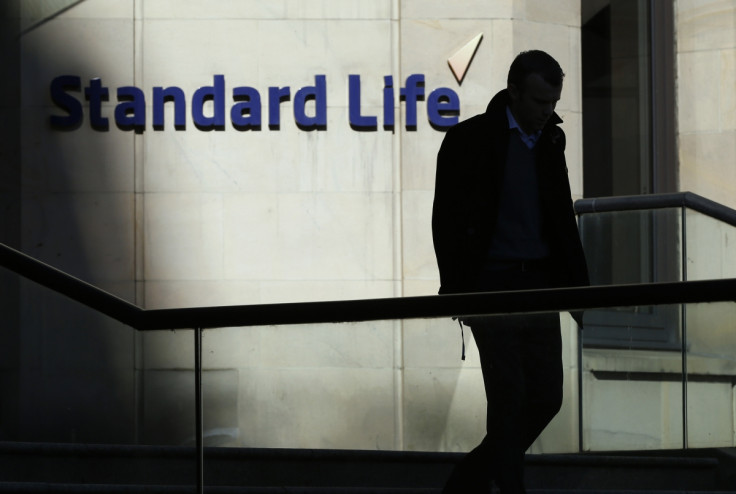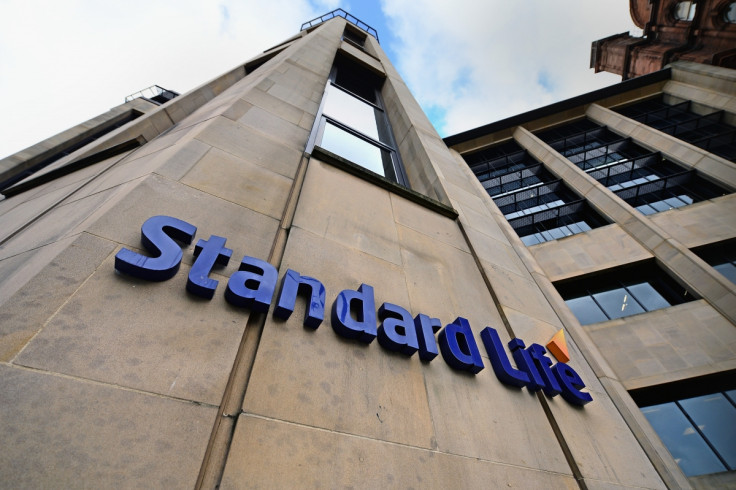Standard Life CFO says business diversification helps weather post-Brexit volatility
Investment management company's finance chief Luke Savage is inexorably drawn to emerging markets expansion and product diversity.

As a FTSE 100 finance boss facing the aftermath of the UK's shock decision to quit the European Union, Luke Savage, Chief Financial Officer of investment manager Standard Life, exudes a remarkable sense of calm, and with good reason.
The industry veteran tells IBTimes UK: "Over two-thirds (67%) of net flows from customers coming into Standard Life are from outside the UK. Following a process of business transformation which picked up pace in 2011-12, we now have customers in over 40 countries and offices in over 20. In that time, we have moved on from being a UK and North America facing business banking on institutional clients, to one that's diversified both by geography and client types.
"Furthermore, Standard Life Investments has rapidly come into its own since the turn of the millennium, moving on from being the back office manager of an insurer into a standalone business in its own right, via the performance of its funds, range of asset classes, solutions it delivers and where they are located."
Today, the Edinburgh headquartered Standard Life has 4.5 million customers and clients worldwide, and another 25 million in India and China via joint ventures in both markets. Nonetheless, in the days and weeks after the 23 June vote, its share price took a battering along with much of the FTSE 100.
A subsequent decision by Standard Life to freeze its £2.9bn property fund after panicked post-Brexit vote withdrawals by investors, came as another blow. Savage describes the measure as a dampening mechanism designed to protect all investors as such funds by their very nature tend to be fairly illiquid.
Seeking a better perspective
However, the Standard Life finance chief appears nonplussed by the market's response to the freeze, which saw the company's stock tumble by as much as 10% before recovering. "A better perspective is required. We have £307.4bn either under management or administration. Standard Life investment manages roughly above £250bn. Our UK property exposure is less than 1% of our business."
"The action we took is not out of the ordinary, in a sense that the terms and conditions under which people buy in to these funds state that the fund manager may suspend activity in order to protect the interests of all investors at times of stress. Yet, it is not a state of permanent paralysis for us. We'll review the situation every 28 days."
At last full-year accounts, Standard Life remains well capitalised under Solvency II with a stable surplus of £2.1bn and solvency ratio of 162%. As for Brexit itself, Savage says his sentiments, and those of fellow Standard Life board members who backed a vote to remain in the EU are in the past.
"The vote has been cast, and the market uncertainty, while unhelpful, is something we have to deal with. We are engaging with the government along with colleagues in the industry via the Association of British Insurers, and ensuring we get an end result that helps us to continue to best serve our customers."
"At the moment, it is difficult for any company, not just Standard Life, to meaningfully gear up if we don't know what the target is. We hope there would be clarity over the coming months. In any market, the legislative climate matters as much, if not more, than macroeconomic permutations," Savage says, adding that Standard Life reacts decisively to evolving scenarios.
The regulatory climate, especially for pensions, is constantly evolving. This has meant that lucrative markets in the past may not be as attractive in the future. "For instance, we took decisive action to shut down operations in Singapore and Dubai because regulatory changes meant the goalposts had shifted there."

Heading further eastwards
By contrast, joint ventures in India and China continue to thrive, as does Standard Life's Hong Kong business, very much a part of an emphasis on emerging markets. The push helped it file a pre-tax profit rise of 9% to £665m last year.
In June, HDFC Life, Standard Life's insurance outfit in India via a minority joint venture with the country's HDFC bank, initiated exploratory merger talks with Max Life Insurance and Max Financial Services.
At its last public filing on 31 March, HDFC Life had ₹742.5bn (£7.7bn, $11.1bn) in assets under management. If the merger goes through, it would create India's largest private insurance company. Potential combined business volumes of the merged entity would see it overtake ICICI Prudential, which is currently India's largest private insurer.
While declining comment on the nature of ongoing talks, and whether he was concerned about a dilution of Standard Life's holdings in the lucrative business, Savage says: "We're in the Indian market for the long term, and the potential for that is great. We've previously said that having increased our stake from 26% to 35%, we would be looking at either an HDFC Life initial public offering (IPO) or a merger – and I can't comment beyond that at this stage."
China, with its inverted age pyramid, also offers a potentially lucrative pensions market with an ageing population looking for retirement solutions. Heng An, Standard Life's 50:50 joint venture with Tianjin Economic Technological Development Area (TEDA) created in 2004, has also now "reached a point where it is generating profits."
1825 and all that

In February 2015, Standard Life purchased Skipton Building Society's financial advisory outfit Pearson Jones. It was subsequently renamed "1825" – a reference to the year Standard Life was founded – and launched as its wholly owned UK-wide financial advice business in response to "unprecedented demand for advice from customers."
Over year on, Savage says it has all to do with the democratisation of financial risk. "In past 10-20 years, both risk and choice of wealth and retirement has been moved from the state and employer to the direction of the individual.
"We first moved from defined benefit to defined contribution, and the need to buy an annuity. Now with pensions freedom, people do not need to buy an annuity anymore. They need to keep that money invested and for individuals that represents some pretty complex financial choices.
"So it is one thing for us to administer someone's pension pot, and completely different thing to deliver great performance on their pension pot. We have for a long time serviced that demand via the Independent Financial Advider (IFA) network but because we viewed demand growing faster than the IFA network, the 1825 move was a logical choice."
"In terms of returns on investment, we have not put a number on it. What we are saying is that it's an area where there is demand which is rapidly increasing. It also means we can support our customers and earn an administration and management fee, as well as a fee from investment advice."
Move to Standard Life
Standard Life was founded in 1825, but has only been a plc for better parts of 10 years following its demutualisation in 2006, a financial services brand that Savage left Lloyds of London to join in a headline grabbing move in August 2014.
But what prompted the move? "I've spent over 30 years in financial and financial support services, and over that time I've covered wholesale corporate banking at Lloyds, debt and commodities at Morgan Stanley, equities at Deutsche Bank, and specialist and general insurance at Lloyds of London.
"Moving to Standard Life was perhaps the only part of the financial services that I hadn't covered. We may have 'Life' in the company's title, but the Life assurance component of the business is only a tiny fraction. Our fee-based revenue represents 94% of the business including pensions, savings, investments and administration of defined contribution pots.
"There aren't that many companies out there with our dividend growth track record and confident in their ability to protect that into the future. So I couldn't resist when the call came."
And what has the finance chief – widely recognised for improving transparency at Lloyds of London and doing away its three-year accounting rule – gotten stuck into at Standard Life? "Bringing about a de-cluttering of our financial statements," Savage answers.
"The concept of financial transparency has universal appeal. I believe in communicating financial information concisely and in a simple way, rather than throw lots of numbers and jargon at people, so that everybody from our 1.3m retail shareholders to ratings agencies and regulators understand what we are about."
© Copyright IBTimes 2025. All rights reserved.






















